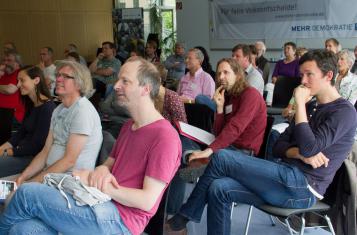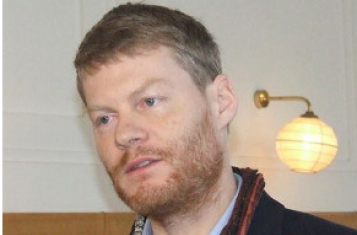“Global democracy development – between dream and trauma” will be the topic of this year’s annual conference jointly co-organised by Democracy International and Mehr Demokratie. Which side do you tend to? Are you rather optimistic or pessimistic concerning the realisation of our dreams? Do you fear that our nightmares will come true?
Currently developments are taking place that affect democracy: surveillance society, data protection, the rights to protest, social rights, trade policies, asylum policies, the saving and regulation of banks are just a few areas to name that are deteriorating. They do not give reason for a lot of optimism.
In my opinion, the solution is that in our days people are striving for personal development and autonomy and that they are commonly working on being free and autonomous. This leads to people’s determination to realise direct and participatory democracy including referenda, constitutional conventions and much more.
Actually, I call this democracy “sovereign democracy”. I really count on this bottom-up-process of becoming aware and autonomous. For these processes to realise we need the right instruments and procedures, I am working on figuring out which ones work.
The topic of your lecture (on Sunday morning, 28 June) is entitled with “More democratic trade agreements – possible at all?” In advance, can you please give us an insight into what you will talk about?
Without revealing too much: I will present a process for how we can negotiate a clean and democratic agreement of international law. This process is so clear and simple that I am almost embarrassed to present this plan :-). With this example, I will demonstrate my idea of a “sovereign democracy” that should follow the currently existing “pre-democracy” (or pluto-democracy) we currently live in.
Moreover, I will present an alternative to TTIP, a dictatorship of international trade and propose a model of “ethical world trade” instead. This model will go hand in hand with an ethical EU foreign strategy. It will be based on a complete turnover of aims and goals.
For years, you have been advocating more democracy at European level. You support the idea of a European convention as a means for the EU to become a project of peace (see Interview with Democracy International here). What is your view of the European Citizens’ Initiative three years being in practice? In your view, how should the ECI be improved?
First of all, the ECI is to be designed as a three-step-procedure of citizen law-making: As soon as one million signatures have been collected, there needs to be an EU-wide referendum. Additionally, there should not be any restrictions with regards to the competence of the European Citizens’ Initiative. For example, it must be possible to repeal the European Council’s mandate of negotiating TTIP. Anything else would be a farce.
In addition, I can think of admitting ECI’s in policy areas that are not fully communitarised. The result would be binding in those countries that succeeded in gathering the necessary amount of signatures. This would run in analogy to the mechanism of enhanced cooperation. Sovereign countries should be able to make use of those initiatives.
Moreover, I support Democracy International’s campaign for reform of the European Citizens’ Initiative, even though in my view they should go further.
Thank you. We look forward to seeing you soon in Fuldatal and discussing with you your ideas.
Interview and translation from German into English by Cora Pfafferott.
You can register for the conference here. You find the agenda here.
You find the original, German interview here (and below).
Credit of Image above: By Bernd Hofmeister, see source here


